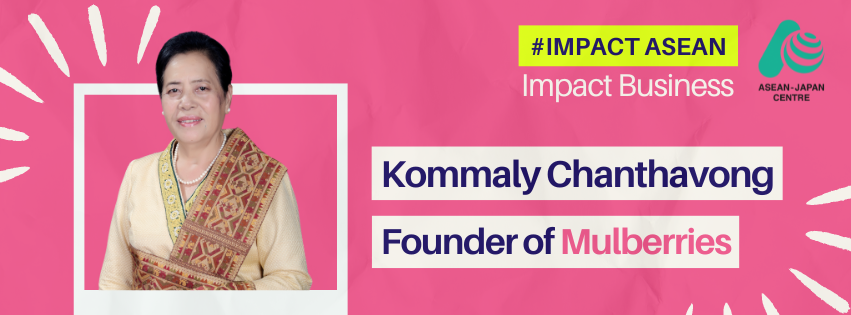Mulberries was established in 1993 but Founder Kommaly Chanthavong’s work began earlier, together with 10 other displaced women from Hua Phan province. Fleeing the unrest of the neighbouring Viet Nam war, searching for livelihoods, and determined to keep Lao silk cultivation traditions alive, Kommaly formed the Phontong Handicraft Cooperative in 1976. Today, Mulberries works with over 3,000 farmers, weavers, and artisans from 219 silk farmer families in Lao PDR.
Mulberry leaves are fed on by the silkworm bombyx mori – which produce Mulberry silk, which comprises 95% of the world production. Kommaly and the team have planted over 1.5 million mulberry saplings across the country.
In 2005, Kommaly was nominated for the Nobel Peace Prize with 1000 Peace Women for her efforts in empowering rural women.
Read more about Kommaly’s #impact journey below.
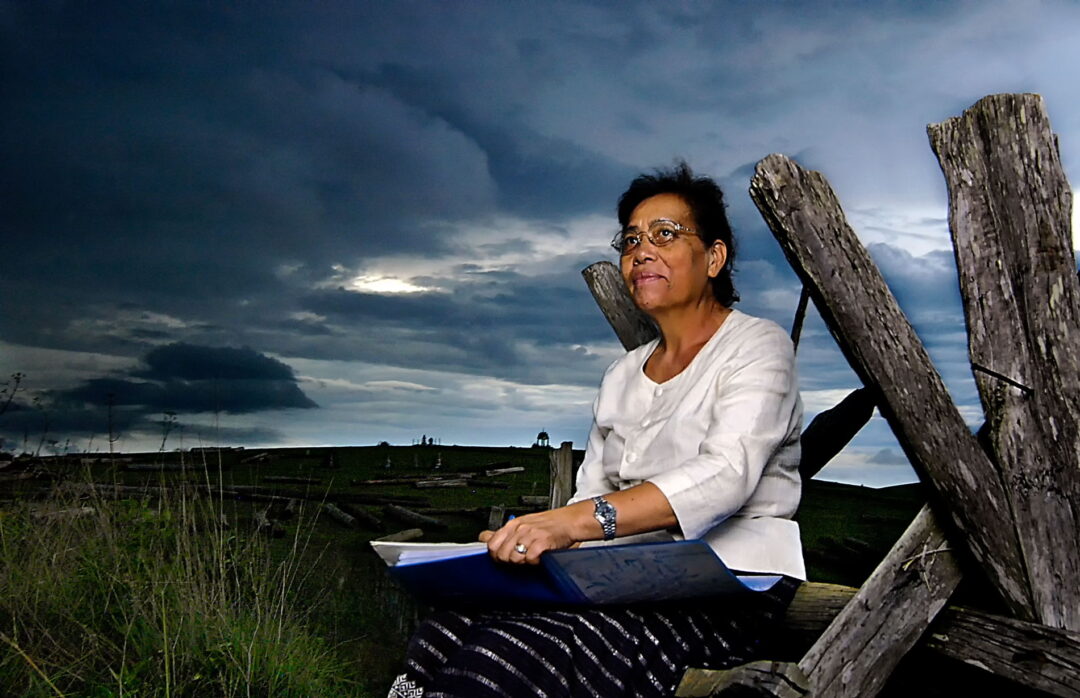
How did your #impact journey begin?
Back in 1976, the Lao government instated a policy to promote traditional handicrafts and cooperatives in Laos. The policy’s two main purposes were to preserve the traditional culture and handicrafts, and to provide work, especially for women.
Phontong Handicraft Cooperative began because of disruption from the Viet Nam war. We moved as refugees from Northern Laos down to live near the capital. Most of us women from the North were skilled at weaving, by tradition. We started the Cooperative as 10 women with an initial investment of 40,000 Kip.
We began with the government providing the raw materials – silk and cotton – that were needed and were paid a fair price for the labour. Through the cooperative’s approach, us women were able to help each other.
In 1980 the government helped us formalize the business, and we expanded further. By 1985, Prime Minister Kaysone Phomvihane visited us and encouraged that we sell products and their raw materials to other cooperatives as well. Our numbers increased from tens to hundreds. We increased the variety of traditional Lao skills or handicrafts that we were promoting – sewing, dyeing, wood carving, basket weaving. Our work expanded to nearby provinces.
We rebranded as Mulberries in 2005. We’ve since evolved into a social enterprise with 45 employees. Currently, we have over 200 hectares of land that have become organic certified between the company and the members and producers.
It has been a 40 year plus journey, and no easy task; but through which I learned the importance of persevering.
– Kommaly Chanthavong, Founder of Mulberries
How did you expand your efforts beyond silk farming – to include agriculture and so on?
The Prime Minister encouraged me to return to the northern provinces where I had grown up and to spread our work there, where women were already quite skilled in traditional weaving and crafts. So then, in 1991 and 1992, with the support of JICA, I and our administrative team went up to Xieng Khouang and Sam Neua and surveyed various villages on silk production activities.
We discovered there were many needs following the end of the Indochina war. A lot of buffalo and cattle were killed during that time, a lot of the forest was destroyed by the napalm, and there were still unexploded ordnances – bombs that were scattered around. So, when people tried to work their fields, there were several people who were killed or injured.
We realized the need to find another means of livelihood to complement farming – given the loss of livestock during the war. And so, our goal became to unlock a revival of traditional craft skills and art – such as sericulture (the raising of silkworms and silk production) and natural dyeing.
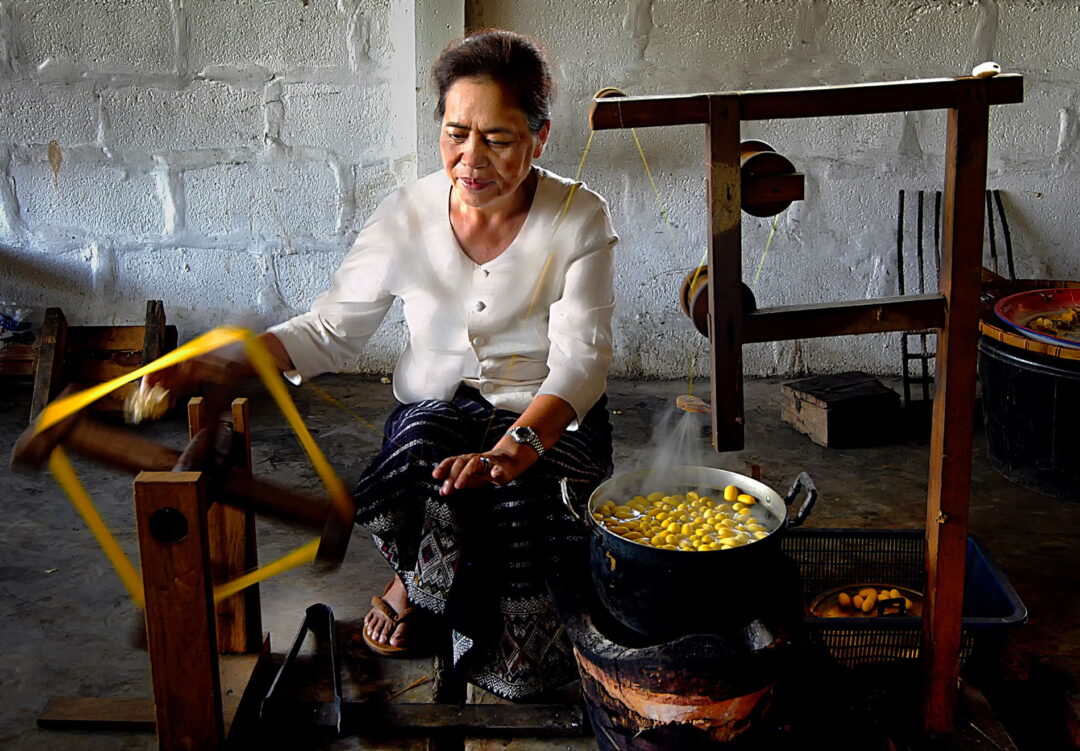
It has been an organic process: the planting of the silk trees, the raising of the silkworms, but we’ve also explored other forms of organic agriculture, other products, and other crops. Following our success, we received further support from the government to expand organic production. One of the things we’ve been focusing on more recently is beans, various kinds of beans as a cover crop to improve the soil, to avoid loss of topsoil, and for nutritional purposes. We experimented and shared our successes with neighbouring villages.
How did partnerships bolster Mulberries’ growth over the years?
Our journey has been collaborative. Partnerships and exchange are essential to learning better practices, and as a way of better understanding yourself, your goals, and your commitments.
After the war, we needed to expand our product portfolio to barter for essential items like rice, sugar, and salt. So, around 1985, we began collaborating with NGOs and provided work for women and strengthened handicraft production, agricultural activities, and community development projects.
These partnerships also enabled us to explore and unlock new markets. To name a few, Mennonite Central Committee (MCC), 10,000 Villages in North America provided us with key markets; we became members of Fair Trade in 2006; and we partnered with JETRO in Japan for market exploration and trial products like kimonos. Since Laos has become a member of ASEAN, it’s helped to expand our effort and markets into Thailand and Vietnam beyond the US and Canada.
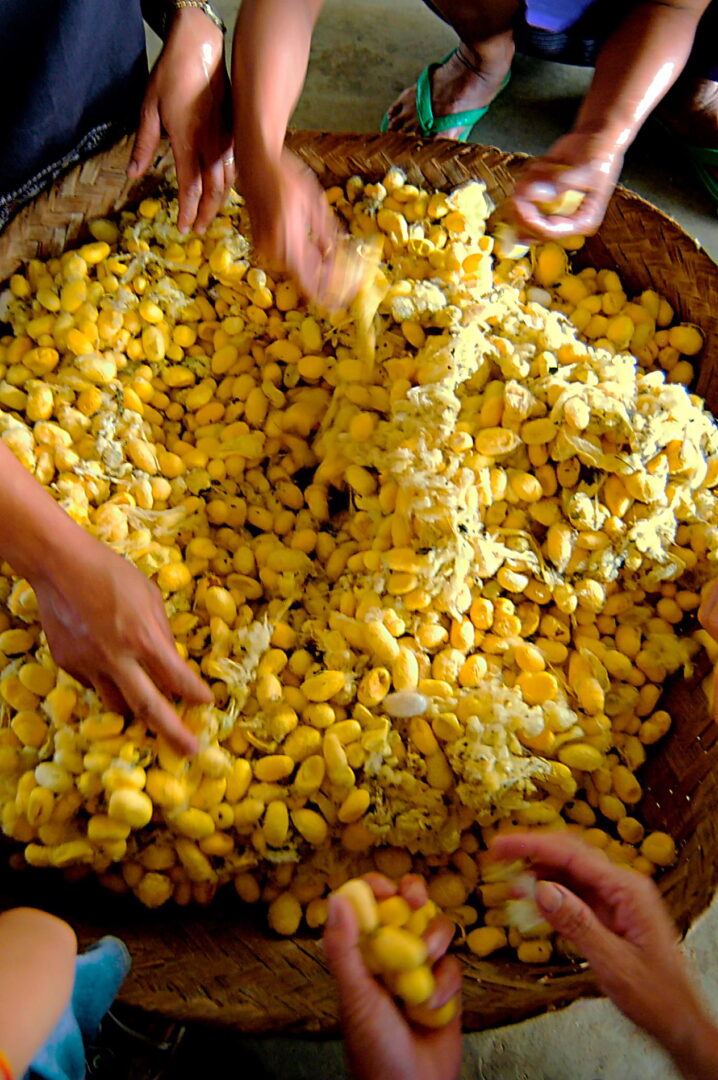
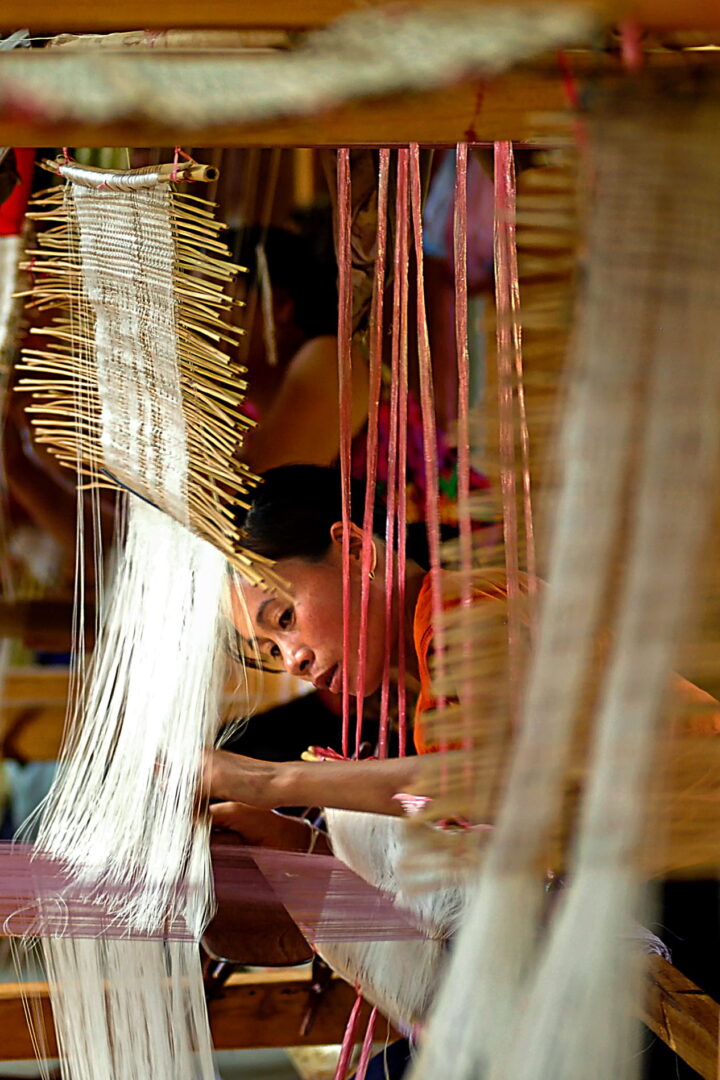
Silkworm cocoons are collected and immersed in hot water to release individual silk strands.
MCC and the Lao Government facilitated study tours and exchange visits for me to the US, Canada, the Soviet Union, Thailand, and Vietnam for further training in management, administration, and community building. Applying the lessons learned from these experiences, along with increased cash flow, helped us expand, provide training for staff, and improve our operations.
What initiatives from the Lao Government has Mulberries benefitted from?
In 1993, the Governor of Xieng Khouang granted 42 hectares of land for us to establish the sericulture work up there, planting mulberry trees, raising silkworms, and related activities
We’ve poured our sweat, tears, and countless hours into this land, making it an invaluable resource for us.
– Kommaly Chanthavong, Founder of Mulberries
It’s a vital space for villagers and producers to see our work and learn from it.
We’re also looking to the Government to support multi-cropping on producers’ land. This approach allows for planting trees for long-term products alongside beans and cover crops among the mulberry trees. Strong government policy on this can help protect farmers’ land and provide both immediate and long-term benefits.
The Government’s role in educating and training young people in agricultural and artisan skills is crucial. We’ve been working with the Departments of Agriculture and Education to address our shared concern about passing these skills to the younger generation. It’s troubling that fewer young people are interested in agriculture or view traditional weaving skills as outdated. Many see it as a lower occupation and gravitate instead towards fields like IT and business management. We’re striving to change these perceptions and promote the value and necessity of farming and weaving and hope the Government will support these as a primary area of study.
How does Mulberries sustain Laotian weaving and silk production traditions?
We try to change the language of how we do things. Instead of saying inciting people with “weaving”, we say “textile design” – to try to raise the value of this work. People can be a part of the design process, show their creativity and express what they see around them as artisans.
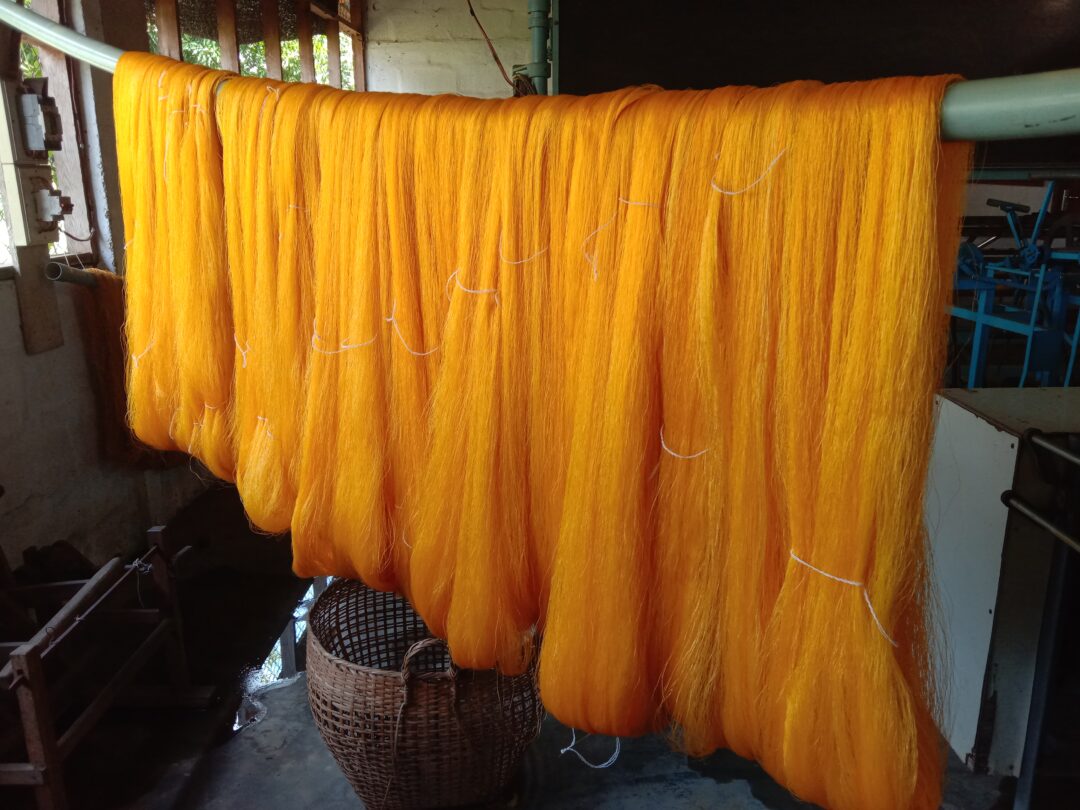
We strive to raise our staff’s skills through training and education, looking at the bigger picture. We provided sericulture, natural dyeing, and weaving training to 1,678 villagers so far. Members of the families of our staff have received further education at the basic levels as well as associate degrees, bachelor’s degrees, master’s, and even one now that’s continued with his Ph.D. studies.
There were thousands of people we were helping to gain income and provide for their families. Our expansion efforts extended beyond the cooperative’s members to include for example, wives of government staff, such as police or soldiers. These women faced displacement and economic challenges, making our cooperative a valuable source of supplementary income for them.
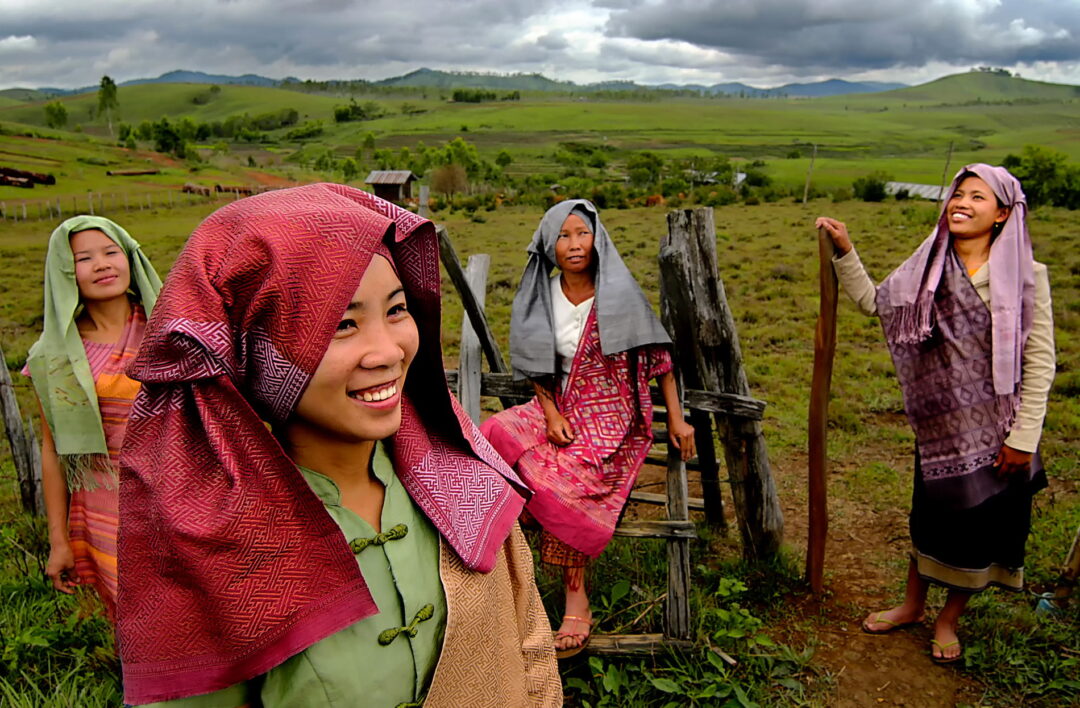
What are some of the challenges you faced and how did you overcome these?
By 1994, we realized that traditional methods of raising silkworms and planting mulberry trees limited our production and made it difficult to reel cocoons due to their varied shapes and sizes. Partnering with Samaritan’s Purse provided funding for further training in Thailand, which helped us improve our techniques. These new methods enhanced the quality of our silk, mulberry trees, and cocoons, leading to increased silk production.
Climate change poses a significant challenge, as varying weather conditions can harm silkworms and crops. Additionally, nearby farmers using non-organic methods can impact our land and operations. Economic challenges, such as the devaluation of the kip, have led to labour shortages as young people seek work in other countries or cities. Despite these obstacles, we have adapted and continued to grow through improved techniques, collaboration, and strategic marketing.
Lastly, when you work in production – you must think about where the raw materials come from and the full process as inextricably interrelated. For us, it goes beyond the weaving stage – but it is also about planting the mulberry trees and producing the leaves; having the leaves to feed to the silkworms; producing the silk ourselves.
*Photos courtesy of Mulberries. Photos were taken by Paul Wager.
Learn more about Mulberries on their website: https://www.mulberries.org/
Disclaimers: This article does not constitute the promotion of the featured business. Interviews have been edited for clarity and conciseness.
| #ImpactASEAN is an initiative by the ASEAN-Japan Centre to spotlight impact investment & sustainable finance ecosystem actors of ASEAN and Japan. The ASEAN-Japan Centre works as an Enabler collaborating directly with its counterparts to promote impact investment through seminars, collaborative workshops, company visits, and research publications among others. Be a part of the #imapct and send us an email at info_rpa@asean.or.jp. |


